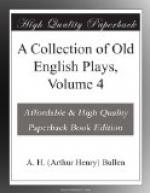[52] Fast-sailing vessels (Span, filibote).
[53] The words “that ... husband” are scored through in the MS.
[54] This and the two following lines are marked for omission.
[55] The next word is illegible.
[56] A long barge with oars.
[57] “Misreated” = misrated? But the reading of the MS. is not plain.
[58] “Do intend” is a correction in the MS. for “have bespoeke.”
[59] Old spelling of convent.
[60] Cautious.
[61] This speech is scored through.
[62] The reading of the MS. is not clear.
[63] Again I am doubtful about the reading of the MS.
[64] “A shewer” = ashore.
[65] Some letters are cut away in the MS. Perhaps Mildew was represented with Judas-coloured (i.e. red) hair; but Raphael presently describes him as “graye and hoary,” and afterwards we are told that he was bald.
[66] Search, probe.
[67] The stage-direction is not marked in the MS.
[68] Track by the scent.
[69] There is no stage-direction in the old copy.
[70] This and the next three lines are marked for omission.
[71] In this soliloquy Heywood closely follows Plautus: see Rudens, i. 3, “Hanccine ego partem capio ob pietatem praecipuam,” &c.
[72] Three cancelled lines follow in the MS.:—
“So if you ... any mercy
for him,
Oh if there be left any mercy
for him
Nowe in these bryny waves
made cleane for heaven.”
[73] This and the eight following lines appear to be marked for omission in the MS.
[74] This line is scored through in the MS.
[75] This line is scored through in the MS.
[76] The words “Some faggotts ... cloathes” are scored through in the MS.
[77] “Monthes mind” = strong desire.
[78] So the MS. But I am tempted to read, at Mr. Fleay’s suggestion, “steeples.”
[79] Cf. Rudens, ii. 1:—
“Cibum captamus e mari:
sin eventus non venit,
Neque quidquam captum est
piscium, salsi lautique pure,
Domum redimus clanculum, dormimus
incoenati.”
[80] The words “hence we may ... wretched lyfe” are scored through in the MS.
[81] In the MS. the words “whither his frend travelled” are scored through.
[82] In the MS. follow some words that have been cancelled:—“Only, for ought I can perceive all to no purpose, but understand of no such people. But what are these things that have slipt us? No countrie shall slippe me.”
[83] “Salvete, fures maritimi.” Rudens, ii. 2.
[84] Honest.
[85] “Trach.
Ecquem
Recalvum ac silonem
senem, statutum, ventriosum,
Tortis superciliis,
contracta fronte, fraudulentum,
Deorum odium atque hominum,
malum, mali vitii probrique plenum,
Qui duceret mulierculas
duas secum, satis venustas?




